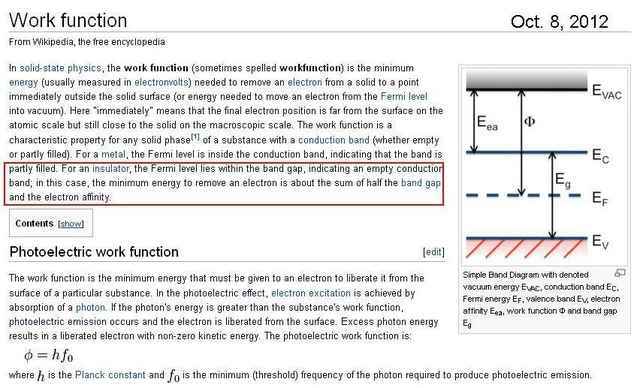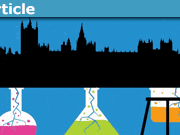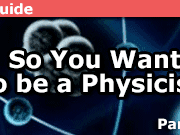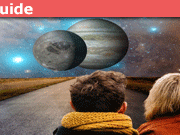Why You Should Not Use Wikipedia As Your Primary Source
It is no secret to anyone who has read my posts in this forum for a while that I do not like Wikipedia. I think that there’s a fundamental flaw with the whole concept and philosophy of it. While I think that it may be useful to many who need a quick lookup for something, it is unfortunate that even more are using it almost as their primary source of information. This is scary considering that (i) the validity of the information being presented is never guaranteed and (ii) the pedagogical presentation of the material is often shoddy, making the subject even more confusing.
I often get asked to look at such-and-such Wikipedia entries, or someone is trying to convince me of something and using a Wikipedia entry as a “reference” to back up his/her argument. It is usually during such instances that I find inaccuracies, confusing statements, and outright errors in such entries. I was doing my search on something a few minutes ago, and I decided, out of curiosity, to see what Wikipedia has to say about “Work Function”. Now, keep in mind that this is a common terminology, especially for physics students, since the photoelectric effect is a “must-know” topic for these students. One would think that this should be a topic that a Wikipedia entry would get it right, considering how many people would look up such a thing, AND, the fact that errors and inaccuracy would, by now, be ironed out.
WRONG!
This is what I first saw on the Wikipedia page on Oct. 8, and my last check today shows that it is still there.
I posted the date in the screen capture as a date stamp on when this was first viewed.
The offending passage has been highlighted with a red box. Let’s look at it closely, shall we?
The description here is on what happened for an insulator (or a semiconductor, for that matter). The figure shown is the simplified band diagram for such a system (i.e. an intrinsic semiconductor, for example), and defines the various quantities such as the work function, bandgap, electron affinity, etc. The problematic statement says this:
For an insulator, the Fermi level lies within the band gap, indicating an empty conduction band; in this case, the minimum energy to remove an electron is about the sum of half the band gap and the electron affinity.
The first part of that paragraph which says “…. For an insulator, the Fermi level lies within the bandgap, indicating an empty conduction band …” is OK. However, the second part is very puzzling and an outright error: “… in this case, the minimum energy to remove an electron is about the sum of half the bandgap and the electron affinity …”
Whoever wrote this is STILL thinking that the work function (Phi) is still the minimum energy needed to produce photoemission, as in the case of a metal. This is FALSE, and anyone who looks at the band diagram can tell. Half of the bandgap plus the electron affinity is the work function Phi, but this is the energy between the vacuum level and the Fermi level. The Fermi level for insulator/semiconductor has NO STATES, and thus, no electrons to excite! After all, it resides in the bandgap! So what is being excited here?
For an insulator/semiconductor, while the work function may still be defined as the energy between the Fermi level and the vacuum level, it no longer corresponds to the photoemission threshold! The photoemission threshold now is the full band gap energy PLUS the electron affinity. You need to excite, at the minimum, the electrons from the top of the valence band to the vacuum level. One can see this clearly by looking at the band diagram in the figure.
Now, you can tell me “But ZapperZ, why can’t you correct these errors, and provide a service to the community?” You will then have missed my point entirely. My problem isn’t with these errors. My problem is the WHOLE PHILOSOPHY of Wikipedia. I find that to be the fundamental flaw, that no one of any authority is being given the ability to write and edit stuff. The errors in the various entries are only the SYMPTOMS of the flawed philosophy. I could spend a lifetime correcting many of these errors (now why would I want to spend a lot of my time to do that in the first place, no one has given me a good reason), and it would not change a thing about my perception of Wikipedia.
If you don’t know the topic you are looking up, and you are using Wikipedia as your PRIMARY SOURCE OF INFORMATION, I would be very scared if I were you.
PhD Physics
Accelerator physics, photocathodes, field-enhancement. tunneling spectroscopy, superconductivity









This discussion is literally going nowhere. Zz admittedly has a problem with wikipedia’s philosophy, which may or may not have needed to go into the insights article, but the argument over what Zz meant has been going on for 5 pages now, even after Zz and I clarified what he meant in post 76 and 77. I don’t feel like any meaningful discussion can take place after 5 pages of this going nowhere. Thread locked.
This is ridiculous. Thread locked pending possible moderation.
“Then the question is whether this is clear in the initial post. Did he write what he meant?”His Op said [quote] I think that there’s a fundamental flaw with the whole concept and philosophy of it. While I think that it may be useful to many who need a quick lookup for something, it is unfortunate that even more are using it almost as their primary source of information. And this is scary considering that (i) the validity of the information being presented is never guaranteed and (ii) the pedagogical presentation of the material is often shoddy, making the subject even more confusing.[/quote]
I think he’s pretty clear.
“There is no debate then because as you said He said”
Then the question is whether this is clear in the initial post. Did he write what he meant?
“But to disagree with the whole philosophy of Wikipedia is nonetheless a claim made in the post, and it is the biggest claim of the post.
There would be no debate if he just said, “Wikipedia should not be used as a primary source” (pure common sense).”
There is no debate then because as you said He said “Please note that, as I stated, and has been pointed out by several members, I’m criticizing the use of Wikipedia as the PRIMARY source of information. Stay in this forum for a while, and you’ll find people using it as not only a primary source, but also as a learning material, as if this is a well-thought out textbook! This is what I am criticizing!”So you agree that you were mistaken and there is no contention.
I’m confused by the emphasis on wikipedia. I agree that it can be annoying that you have to correct misconceptions caused by wikipedia from time to time. But is it just wikipedia that can cause misconceptions? No! Most of the misconceptions that people deal with here come from popularizations. People read a popular science article or watch a documentary, and they think they understand the subject and come here to argue with grad students and professors. I’m really confused that I don’t see anything like this insight post about popular science articles while its really a routine thing here to explain to people that they can’t learn science relying only on popularizations.
I rally don’t think the problem is with the popular science articles/documentaries and wikipedia, the real problem is with people and how they think they can become an expert in the field using wikipedia and popular science articles/documentaries.
To me, it seems that there is a toolbox in front of us for learning science: Textbooks, popular books, popular articles, popular documentaries, lecture videos from universities, our own university classes, lecture notes,… and wikipedia! Its people’s job to use the right tool for their job. Its really irrational to blame a screwdriver because you want to saw wood with it and you can’t!
I’m definitely with atyy here. But it doesn’t mean I don’t agree with ZapperZ. I just want to say that instead of blaming wikipedia or popular science articles/documentaries, we should have insight articles explaining each of the tools in the learning toolbox are good for which level of learning.
“Yes, he disagrees with the whole philosophy of wikipedia, but this thread is about wikipedia as a primary resource.”
But to disagree with the whole philosophy of Wikipedia is nonetheless a claim made in the post, and it is the biggest claim of the post.
There would be no debate if he just said, “Wikipedia should not be used as a primary source” (pure common sense).
Yes, he disagrees with the whole philosophy of wikipedia, but this thread is about wikipedia as a primary resource.
“Yes, because Zz refered to the “whole philosophy” of wikipedia with respect to primary resources. There are other things wrong with the philosophy of wikipedia, but this thread IS about wikipedia as primary resource.”
The alternative reading, quite plausible is that he disagrees with the whole philosophy of Wikipedia, and that the misuse by some is only part of his disagreement.
If you read the quote by Evo in the post above, this is borne out by the use of “especially”.
Furthermore, the sentence with “WHOLE PHILOSOPHY” is separate, and the term has every single letter in capitals.
“Does it make sense to say that Wikipedia is ok as a starting point, and yet the “WHOLE PHILOSOPHY” of Wikipedia is wrong?”
You are grossly misrepresenting what Zz said.
He said “Please note that, as I stated, and has been pointed out by several members, I’m criticizing the use of Wikipedia as the PRIMARY source of information. Stay in this forum for a while, and you’ll find people using it as not only a primary source, but also as a learning material, as if this is a well-thought out textbook! This is what I am criticizing!”
“Does it make sense to say that Wikipedia is ok as a starting point, and yet the “WHOLE PHILOSOPHY” of Wikipedia is wrong?”
Yes, because Zz refered to the “whole philosophy” of wikipedia with respect to primary resources. There are other things wrong with the philosophy of wikipedia, but this thread IS about wikipedia as primary resource.
“Yes, atyy is wrong. Zz is correct that wikipedia should not be used as a primary source and that it should be understood that what wikipedia says today can be changed tomorrow. You never know what version of something you are looking at, is it correct, was it correct? As a starting point to begin reasearching something , it’s ok, but it should not be used as a primary correct source. This is what Zz, I believe, is trying to get across, but atyy doesn’t seem to get.”
Does it make sense to say that Wikipedia is ok as a starting point, and yet the “WHOLE PHILOSOPHY” of Wikipedia is wrong?
“So don’t let us slide down that greasy pole ZapperZ and I are worried about. As some of us who have scholarly standards retire and die out, (no matter how modest our own gifts), keep the flame of vigilance burning! Do your best, and Godspeed.”
Yes, atyy is wrong. Zz is correct that wikipedia should not be used as a primary source and that it should be understood that what wikipedia says today can be changed tomorrow. You never know what version of something you are looking at, is it correct, was it correct? As a starting point to begin researching something , it’s ok, but it should not be used as a primary correct source. This is what Zz, I believe, is trying to get across, but atyy doesn’t seem to get.
A printed encyclopdia can have errors, but the errors can be pointed out and the printed version can’t be altered, so the corrections stand. This is not true of wikipedia where the entries can be changed daily, most users don’t know that they can look at the history of changes, much less know which changes are correct.
Well, to be fair to the lecturer, he did correct himself the next lecture. He was a world class yeast geneticist, but the portion he messed up on was population genetics.
A number of years later, I had to teach freshman physics to a very, very small class, which I imagined should be no problem. But for some reason, I’d never done fluid mechanics properly, and spent I think a whole weekend or much more sweating to understand the chapter in Young (standard freshman text).
So don’t let us slide down that greasy pole ZapperZ and I are worried about. As some of us who have scholarly standards retire and die out, (no matter how modest our own gifts), keep the flame of vigilance burning! Do your best, and Godspeed.
“For some reason, this reminds me of a class I taught some years back on complex analysis when a student objected to my correction of their erroneous homework problem solution by stating they had copied their answer from an online answer book for our text.
Four things about this totally blew my mind: 1) they had used an answer book instead of doing the work themselves; 2) they did not trust me to have done the work myself and gotten it right; 3) they had the nerve to admit they had cheated on the work; 4) some grad student had gone to the trouble of writing and publishing a book answering questions they had not troubled to get right…. I made another check mark in the “I’m too old for this” category, and inched closer to retirement.”
I once objected to my lecturer in genetics that his answer was wrong. He told me he thought it was right, because he had copied it out of a book!
For some reason, this reminds me of a class I taught some years back when a student objected to my correction of their erroneous homework problem solution by stating they had copied their answer from an online answer book for our text.
Four things about this totally blew my mind: 1) they had used an answer book instead of doing the work themselves; 2) they did not trust me to have done the work myself and gotten it right; 3) they had the nerve to admit they had cheated on the work; 4) some grad student had gone to the trouble of writing and publishing a book answering questions they had not troubled to get right…. I made another check mark in the “I’m too old for this” category, and inched closer to retirement.
“I don’t have as strong of an objection when people use it as a starting point (and I don’t mean as a “primary” source), and then go get more information elsewhere (i.e. using Wikipedia as you call it as secondary source). This is because while it is convenient, I do not consider it to be trustworthy because of its basic premise and philosophy on how it operates.”
Okay. Your statement in the insights article had me scratching my head a bit.
“To be honest, I’m also a little confused by what Zz means by “Whole Philosophy”.
[USER=6230]@ZapperZ[/USER] , obviously you disagree with using wikipedia as a primary source, and I don’t think anyone would disagree with you on that. But when you say that you disagree with their whole philosophy do you mean that you think wikipedia’s core principles should be abandoned because they simply don’t work to make the site a useful source of secondary information? I assume you’re not saying that wikipedia’s whole philosophy tries to make it a primary source of information, but rather that people use it as a primary source when they shouldn’t. Is that correct?”
Correct.
I don’t have as strong of an objection when people use it as a starting point (and I don’t mean as a “primary” source), and then go get more information elsewhere (i.e. using Wikipedia as you call it as secondary source). This is because while it is convenient, I do not consider it to be trustworthy because of its basic premise and philosophy on how it operates.
I’ve been here long enough to have encountered people whose whole “world of science” is nothing but Wikipedia! And when someone tries to argue with you by citing a faulty Wikipedia entry more than once, you get VERY tired at not only trying to correct this person’s wrong ideas, but also trying to explain why that Wikipedia entry is wrong! We shouldn’t have to do double work because of that.
Zz.
“Because that itself may be Wikipedia’s philosophy – that it be used as a secondary source. So it would be wrong to impugn a “WHOLE PHILOSOPHY” when one might actually agree with it.”
To be honest, I’m also a little confused by what Zz means by “Whole Philosophy”.
[USER=6230]@ZapperZ[/USER] , obviously you disagree with using wikipedia as a primary source, and I don’t think anyone would disagree with you on that. But when you say that you disagree with their whole philosophy do you mean that you think wikipedia’s core principles should be abandoned because they simply don’t work to make the site a useful source of secondary information? I assume you’re not saying that wikipedia’s whole philosophy tries to make it a primary source of information, but rather that people use it as a primary source when they shouldn’t. Is that correct?
“Alright, so you agree that wikipedia should not be used as a primary source. And you agree that there are crucial benefits in actual science books that are not in wikipedia. So I don’t get why you are arguing then.”
Because that itself may be Wikipedia’s philosophy – that it be used as a secondary source. So it would be wrong to impugn a “WHOLE PHILOSOPHY” when one might actually agree with it.
“No, you are arguing against Zz saying that wikipedia can be used as primary source. This means primarily reading wikipedia articles and refering to a book for more details. So why do you think this is as good as going through Tao’s analysis book?”
Also, you do not make it clear here what “primary source” means. What if I look at Wikipeda first, then study Tao’s book? Given all the non-standard definitions in this thread, why wouldn’t one call Tao’s book a primary source and Wikipedia the secondary source?
Alright, so you agree that wikipedia should not be used as a primary source. And you agree that there are crucial benefits in actual science books that are not in wikipedia. So I don’t get why you are arguing then.
“No, you are arguing against Zz saying that wikipedia can be used as primary source. This means primarily reading wikipedia articles and refering to a book for more details. So why do you think this is as good as going through Tao’s analysis book?”
No, I am not. I am arguing that against his point that there is a problem with Wikipedia’s “whole philosophy”. My point is that Wikipedia’s whole philosophy is in agreement that Wikipedia is not a primary source.
“That’s for you to argue. My point is that Wikipedia is valuable.”
No, you are arguing against Zz saying that wikipedia can be used as primary source. This means primarily reading wikipedia articles and refering to a book for more details. So why do you think this is as good as going through Tao’s analysis book?
“Everything that you can find in Tao’s book is something you can find on wikipedia. So why would you read Tao’s book instead of wikipedia?”
That’s for you to argue. My point is that Wikipedia is valuable.
“I replied to this above, but let me stress what I think is wrong here. If you are trying to be an an expert in analysis, then you read Tao’s book? Is Wikipedia intended to be on the level of Tao’s book. No. It is like criticizing a harmony textbook for not being a Beethoven symphony.”
Everything that you can find in Tao’s book is something you can find on wikipedia. So why would you read Tao’s book instead of wikipedia?
“What I do mean is that many experts have a lot of valuable insights on a certain topic. So when I choose to read an analysis book and I choose to read Tao’s book, then I trust Tao to give me a lot of neat insights, that he will not lead me astray, that it will actually teach me analysis in a comfortable but accurate way. Yes, there will be errors in his book, but that is not my point. The wikipedia people are usually not experts in a field, and this shows in a lot of cases. And this shows not necessarily in the amount of errors, but rather in the amount of insights you can get from it, and the amount of analysis I can learn by actually reading the wikipedia articles on it (which is: not much).”
I replied to this above, but let me stress what I think is wrong here. If you are trying to be an an expert in analysis, then you read Tao’s book? Is Wikipedia intended to be on the level of Tao’s book. No. It is like criticizing a harmony textbook for not being a Beethoven symphony.
“That’s his definition in post #14.
”
I do not see any definition in post #14. I see Zz giving an example of what it means to use a primary source. In that example, the source happened to be an only source. You have incorrectly deduced that primary source = only source.
”
Sure, authority is valuable. But that does not make authority inerrant, nor does it mean that amateur contributions are not valuable. This this is not sufficient argument against the “WHOLE PHILOSOPHY” of Wikipedia.”
So you would support a physics professor saying to his students: “we will not use a book for this course, we will rely mainly on wikipedia and my lectures. So for the exam, just study the relevant wikipedia articles.” ? Or would you support a physics professor who says “We will use Tao’s analysis book for this course. For the exam, just study his book.”?
Which one do you prefer and why?
“That is not Zz’s definition. He never said it was his definition.”
That’s his definition in post #14.
“Here’s where you are wrong: authority is often a good thing! The crucial part is to know when to rely on authority.
Let me expand on this. What I do not mean is somebody reading a calculus book from a famous mathematician and encountering a theorem in there. Then he goes on and says “the theorem is true because this famous mathematician said so”. This is a bad form of authority. The student learning calculus should indeed apply logic to understand and reason about the theorem himself.
What I do mean is that many experts have a lot of valuable insights on a certain topic. So when I choose to read an analysis book and I choose to read Tao’s book, then I trust Tao to give me a lot of neat insights, that he will not lead me astray, that it will actually teach me analysis in a comfortable but accurate way. Yes, there will be errors in his book, but that is not my point. The wikipedia people are usually not experts in a field, and this shows in a lot of cases. And this shows not necessarily in the amount of errors, but rather in the amount of insights you can get from it, and the amount of analysis I can learn by actually reading the wikipedia articles on it (which is: not much).
Also, when you end up doing research, you will have to rely on authority multiple times. You simply do not have the time to check and investigate all the claims people make in papers. This is simply the way research is. Students such know which authority to trust and which not. Students should learn when a certain claim is suspicious, and when they can comfortably cite it. This is a crucial part of being a scientist.”
Sure, authority is valuable. But that does not make authority inerrant, nor does it mean that amateur contributions are not valuable. This this is not sufficient argument against the “WHOLE PHILOSOPHY” of Wikipedia.
”
Furthermore, I find the suggestion that there should be “sole sources” (using ZapperZ’s own definition of “primary source”)
”
That is not Zz’s definition. He never said it was his definition.
“and the argument from authority in learning maths and science to be problematic. In general, one should read many sources, and one should not depend on authority, but on logic and evidence.”
Here’s where you are wrong: authority is often a good thing! The crucial part is to know when to rely on authority.
Let me expand on this. What I do not mean is somebody reading a calculus book from a famous mathematician and encountering a theorem in there. Then he goes on and says “the theorem is true because this famous mathematician said so”. This is a bad form of authority. The student learning calculus should indeed apply logic to understand and reason about the theorem himself.
What I do mean is that many experts have a lot of valuable insights on a certain topic. So when I choose to read an analysis book and I choose to read Tao’s book, then I trust Tao to give me a lot of neat insights, that he will not lead me astray, that it will actually teach me analysis in a comfortable but accurate way. Yes, there will be errors in his book, but that is not my point. The wikipedia people are usually not experts in a field, and this shows in a lot of cases. And this shows not necessarily in the amount of errors, but rather in the amount of insights you can get from it, and the amount of analysis I can learn by actually reading the wikipedia articles on it (which is: not much).
Also, when you end up doing research, you will have to rely on authority multiple times. You simply do not have the time to check and investigate all the claims people make in papers. This is simply the way research is. Students such know which authority to trust and which not. Students should learn when a certain claim is suspicious, and when they can comfortably cite it. This is a crucial part of being a scientist.
“I don’t understand what you’re arguing against atyy. You seem to be bringing up some very pedantic points now, but you have never pointed up what your stance is towards wikipedia and Zz’s article. Zz does not mean a first hand account to be a primary source. No, it’s not the usual definition, but who cares.
Can you say what your actual stance is, vs just bringing up small points as an argument?”
My stance is that Wikipedia’s “WHOLE PHILOSOPHY” is good and it is not flawed.
Criticizing Wikipedia’s “WHOLE PHILOSOPHY” on the basis that some misuse it is not correct criticism of Wikipedia, since it is not intended to be a primary source.
Furthermore, I find the suggestion that there should be “sole sources” (using ZapperZ’s own definition of “primary source”) and the argument from authority in learning maths and science to be problematic. In general, one should read many sources, and one should not depend on authority, but on logic and evidence.